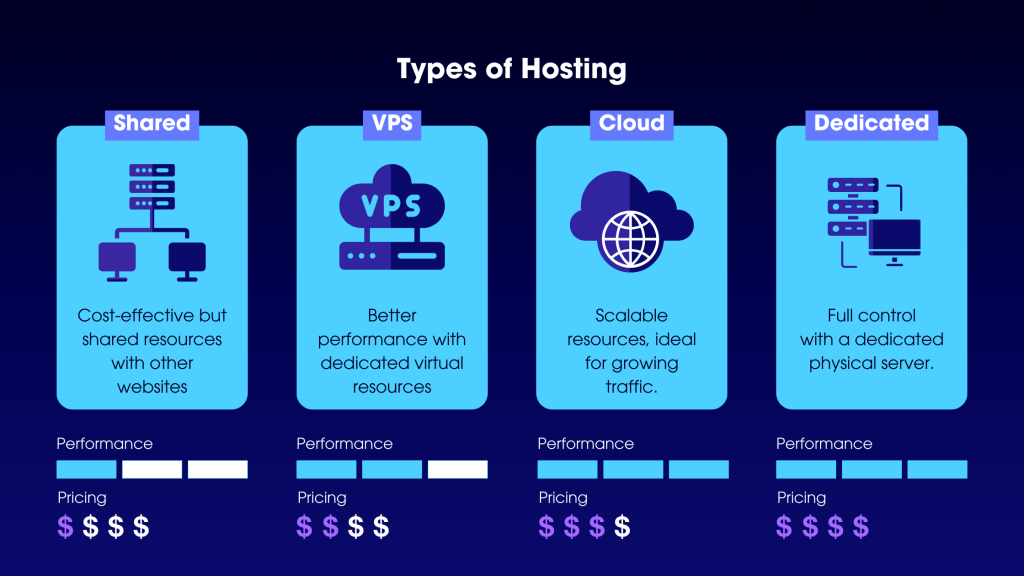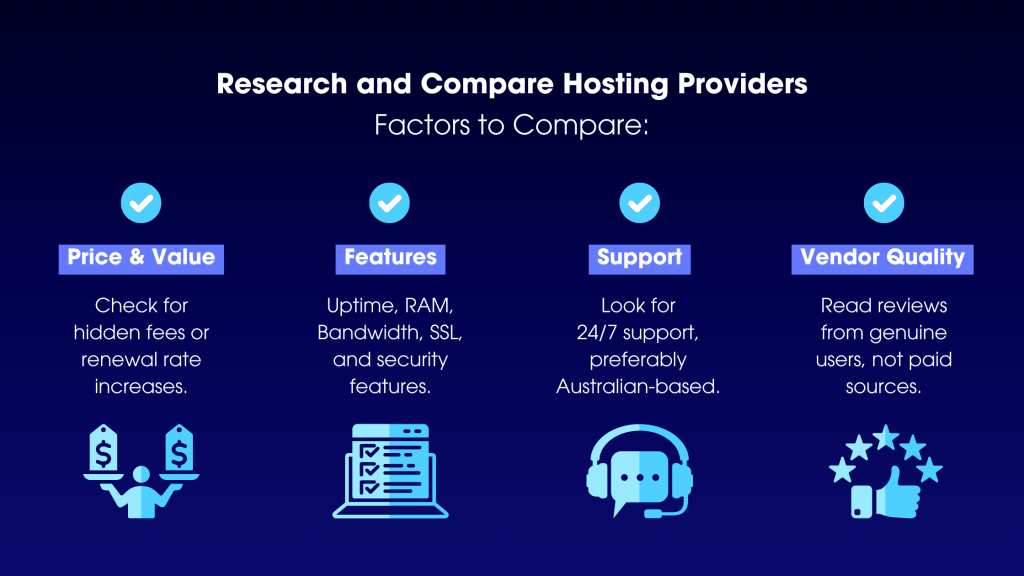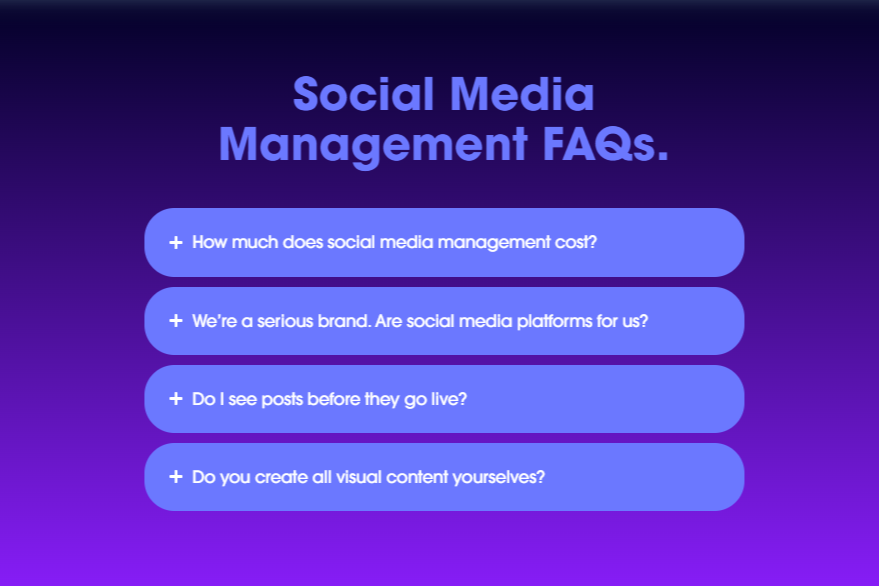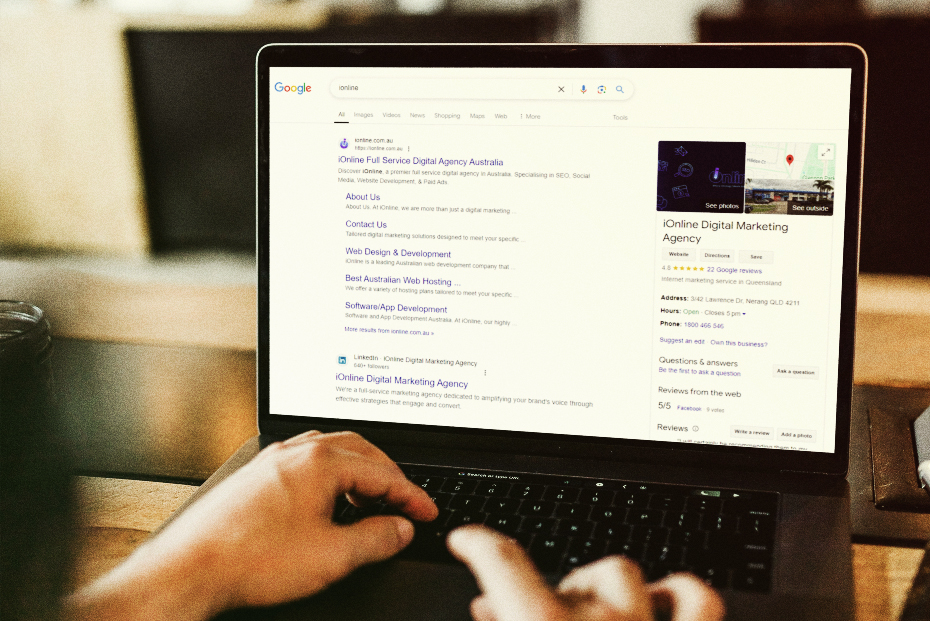Your website is one of your business’s most critical assets – and, to stay live, it needs reliable, high-speed hosting. But choosing the right hosting provider isn’t easy, especially if terms like ‘CDN’ and ‘NGINX’ feel like a foreign language.
Luckily, this article will give you all the information you need to make an informed choice. We’ll break down the different types of hosting, explain how you can compare providers, and tell you what to look for when it comes to essential features.
Understand the Different Types of Web Hosting
Before you can compare hosting providers, you need to understand exactly what web hosting is. A website is, basically, lots of different files displayed together. But, just like documents on your computer, those files have to be stored somewhere.
That ‘somewhere’ is normally a web server, which is a high-powered computer specifically designed to deliver website files and assets. It’s designed to be always online and much more reliable than a normal computer. This high-powered server processes requests that come in from the internet and returns the right files, which is how a web page is loaded. When you sign up to a hosting provider, you’re paying to rent space on a server.
But not all hosting is created equal. Shared hosting, the least expensive kind, means your website shares the same server as other websites – all your files are stored on the same computer. That means server memory and other resources will be divided between you and the other tenants. Most providers set per-tenant usage limits to prevent one tenant from slowing down the performance of other tenants’ websites.
Virtual private server (VPS) hosting also uses one physical server for multiple tenants. Unlike shared hosting, though, that server’s resources are divided across multiple virtual servers. Each tenant then gets their own virtual server, which means better performance and more control. Think of it like owning your own apartment over sharing a house.
Cloud hosting involves hosting your site’s files on multiple virtualised servers. If your traffic exceeds the limits of one server, the others will instantly pick up the slack – unlike a VPS, where excessive traffic could lead to poor performance. It’s like having unlimited apartments that you can pay to access whenever you need.
Dedicated hosting is the most expensive kind of hosting. Your website will be hosted on a dedicated physical server, which you’ll normally be able to manage as you see fit. The main benefits: server control and security. It’s a bit like owning a house.

Work Out Your Business’s Needs
If you’re reading this, you’re probably a small business owner. That means you probably don’t need a VPS or dedicated server – shared hosting is ideal for most small businesses. We’ll go over the different features you should look for shortly.
Work Out Your Budget
Hosting is generally categorised as an IT or technology expense, because the technical components of a website are, in larger businesses, owned by IT teams (rather than marketing or product teams). That means you’ll need to look at your IT budget and work out how much you can afford to allocate to hosting. If you’re a small business and don’t have a set IT budget, try to keep your hosting costs under $700 a year.
Research and Compare Hosting Providers
Once you know what your business needs and what you can afford, shortlist 5–8 hosting providers. If possible, include both large international providers (try Googling ‘website hosting australia’) and smaller local providers (try Googling ‘website hosting [your city]’). Smaller providers often have competitive rates and better support than big players like Bluehost and Godaddy.
Evaluate your shortlisted hosting providers using the 4 criteria below.

Check the Price
When you’re comparing providers, check each one’s total annual cost. Many providers add on essential services (such as SSL) during checkout; others offer heavily discounted prices for your first year, and then raise them to the true price in subsequent years.
Price isn’t the most important aspect of hosting, but you do need to make sure that you’re getting good value for money and that the total cost matches your budget.
Check the Hosting Type and Features
A typical provider’s web hosting offerings will generally be shared hosting (unless otherwise specified). If you’re a small business with no plans to scale quickly, that’s probably all you need.
Keep in mind that different shared hosting packages have different inclusions. Here’s a breakdown of common inclusions/features and what you should look for.
- Uptime: This is the percentage of time that your hosting service will be functional, based on historical averages. Ninety-nine per cent uptime or higher is the industry standard.
- RAM: This is the amount of storage you’ll have access to for your site’s files. Most SMB sites use 1–2 gigabytes of RAM.
- Bandwidth: This is the amount of data your plan can transfer over the course of a month. Your data usage depends on the size of your web pages, your traffic numbers, and whether visitors are likely to download anything. Some providers express bandwidth in approximate visitor numbers instead of gigabytes.
- SSL: An SSL certificate enables your site’s traffic to be protected by TLS, a security protocol. It’s essential for modern websites, so most providers (including us) offer it as a free add-on.
- cPanel: This is an interface that allows you to manage your site’s files without accessing the server itself. Without cPanel access (or an equivalent), you won’t be able to make substantial changes to your site’s structure or templates without a web professional’s help.
- Backups: Your provider should automatically save a copy of your site daily (and store at least 5 copies). If malware or something else compromises your site, you can restore it from a point-in-time backup instead of requiring a ground-up rebuild. Remember: mistakes happen. Backups mean you can restore your site if you or your web developer break something.
- Security: Your hosting should include a firewall, which filters traffic based on specific rules. That will prevent malicious users from probing or attacking your site.
- Server: NGINX is better than the alternative, Apache, for most SMB sites. It’s faster and can handle traffic more efficiently.
- Server Location: The further away a server is from your visitors, the slower your site will load. Aim for an Australian-based server (ours are based in Brisbane).
- CDN: A content delivery network helps speed up your website by storing copies of your site files on connected servers that are geographically closer to your visitors. You may not need a CDN if your server is located near your target audience.
Understand the Support You’ll Get
Hosting support – like a lot of software support – matters. There’s a good chance you’ll need to talk to a support agent at some point, and you need someone who can communicate with you effectively, understand your business’s needs, and actually solve your problem. Many hosting providers outsource their support offshore, which can create issues if you need to talk through a complex issue.
At a minimum, you need live support (whether that’s via phone, online chat, or ticket). Email simply isn’t good enough unless you’re willing to wait upwards of a week to have your issue resolved. Australian-based support is even better. You won’t experience communication issues, and you won’t normally be routed through the same time-consuming support scripts that offshore agents are often forced to follow.
Review the Vendor’s Quality
Not all hosting providers deliver the same quality. A simple way to check the level of service you’re likely to receive is to Google ‘[company] reviews’ – or, for local hosting services like us, look at the reviews on the brand’s Google Business Profile.
For example, you could Google ‘bluehost reviews’ or ‘bluehost reviews australia’ to see what business owners like you think of Bluehost, one of the biggest WordPress hosting companies. Be wary about biased reviews from other companies (who often receive commission from link clicks and referrals). Instead, look at sites like ProductReview, Reddit, and Trustpilot to see what actual users think.
Try iOnline
If you’ve read this far, followed the 3 steps we’ve detailed above, and still aren’t sure who you should trust with your site’s hosting, book a free consultation with us. We’ve been hosting Australian sites since 2000 – our servers are located in Brisbane, we offer live support from our Gold Coast headquarters, and we’re cost-competitive with the biggest hosting services.
Review our annual plans or schedule a free 30-minute chat with one of our senior technicians to find out exactly what your hosting could include.












